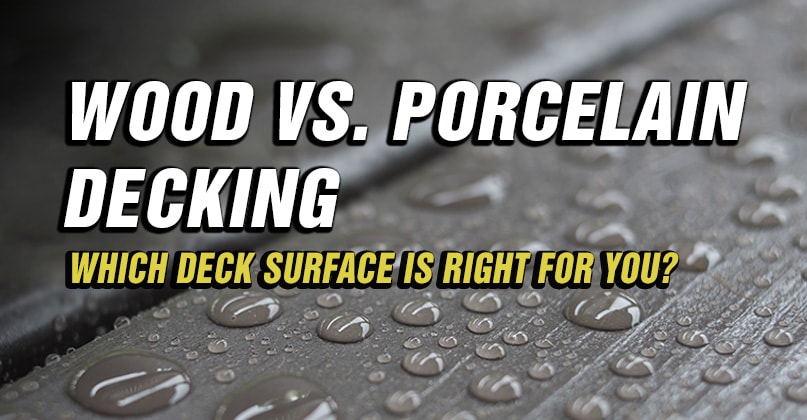Heat Pump vs Conventional AC (Air Conditioner): Which is Better for Cooling? Summer is here and it’s bringing the heat. But I can’t complain because I love the summer weather,...

Wood vs. Porcelain Decking
By Mike Holmes
Mike’s Advice / Outdoor Renovations
Friday, June 15th, 2018 @ 11:33pm
Deck boards aren’t limited to the same material as its base; you can actually use any kind you like. If you’re looking for a one-size fits all solution, it doesn’t exist. Deck materials have different benefits and drawbacks depending on your needs, so it’s just a matter of finding the right one that fits yours.
Wood
PROS:
Affordable. A deck made from manufactured materials such as composite, steel or PVC can cost three to five times more than a comparable wood deck.
Aesthetically pleasing. The look and smell of all-natural wood can’t be replicated by other materials. It gives a home a cottage-like feeling making your patio feel like an outdoor getaway.
Naturally pre-treated. Higher-end woods, like cedar and redwood, resist decay and insect infestation and are strong enough to reduce the risk of warping and splitting.
Long-lasting. Preservative or pressure-treated (PT) lumber can improve resistance to weather and can last considerably longer than non-treated wood. When properly maintained, a wood deck can last as long as 15 years.
Heat-resistant. Unlike other deck materials, such as some composite woods or steel, a natural wood deck is easy to walk on with bare feet during hot summer days.
CONS:
Requires regular maintenance. A wood deck is prone to splitting, cracking and splintering making the deck unsafe. It must be checked at least once a year, usually around spring to make sure all parts are secure and intact. It also requires regular washing/cleaning, sanding and staining/sealing on an ongoing basis, depending on the severity of the damage caused by weather and outdoor elements.
Prone to rotting. Wood constantly exposed to moisture can rot and weaken the boards, especially if boards are warped and begin to pool water in particular areas.
Combustible: Wood of course is combustible, so caution is required when using BBQs or fire pits.
Porcelain
PROS:
Stronger deck boards. Porcelain deck boards supported by an aluminum tray makes a deck surface stronger, so it can safely support a tremendous amount of weight. This also makes the deck surface more invulnerable to harsh weather.
No gap between boards. Thanks to an 8-inch wide aluminum tray with a built-in tongue and groove design, porcelain deck boards can be installed tight together with no visible gap between them.
Prevents mould and mildew. Porcelain deck boards have a hard surface that does not absorb moisture, which helps prevent mould growth and mildew.
Stain-resistant. Porcelain deck boards do not stain. The surface of the porcelain is so hard that it does not absorb moisture, so things that would normally stain other surfaces, such as composite wood or wood, can be washed off a porcelain surface.
Weather-resistant. Porcelain deck boards will not expand and contract with varying weather conditions, which helps prevent structural damage to the deck.
Non-combustible. Porcelain deck boards are non-combustible with a zero flame-spread rating.
Scratch-resistant. Porcelain deck boards do not scratch or scuff under normal use. Other materials, including some composite wood products, can scratch easily by just moving patio furniture across the surface.
CONS:
Expensive. Porcelain deck boards can cost considerably more in comparison to composite wood or all-natural wood deck boards.
Breakable. Porcelain deck boards are durable, but on the rare occasion they can crack or break on high-impact. If this occurs tiles are chipped out of their existing aluminum tray and replaced with another tile.







